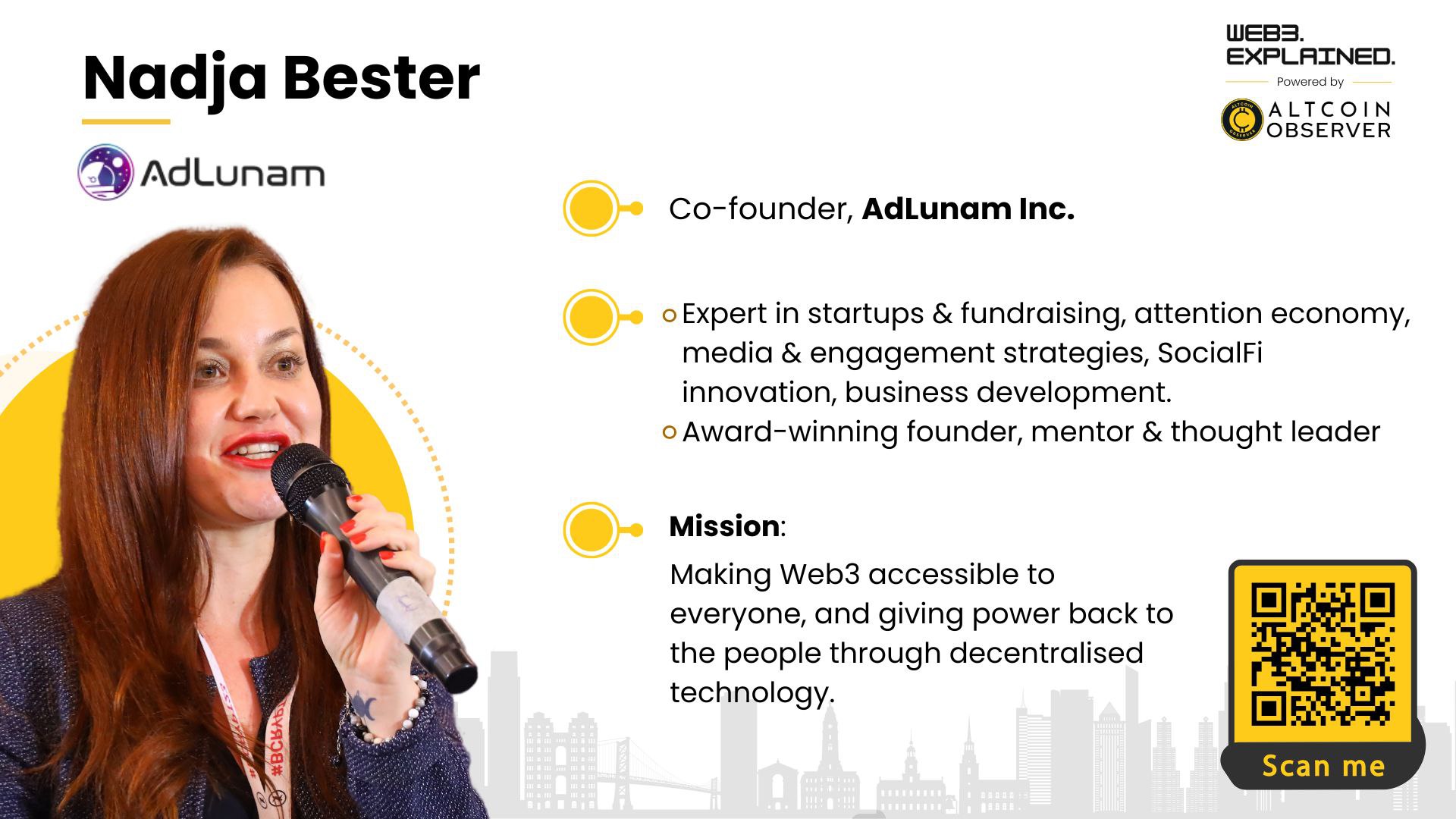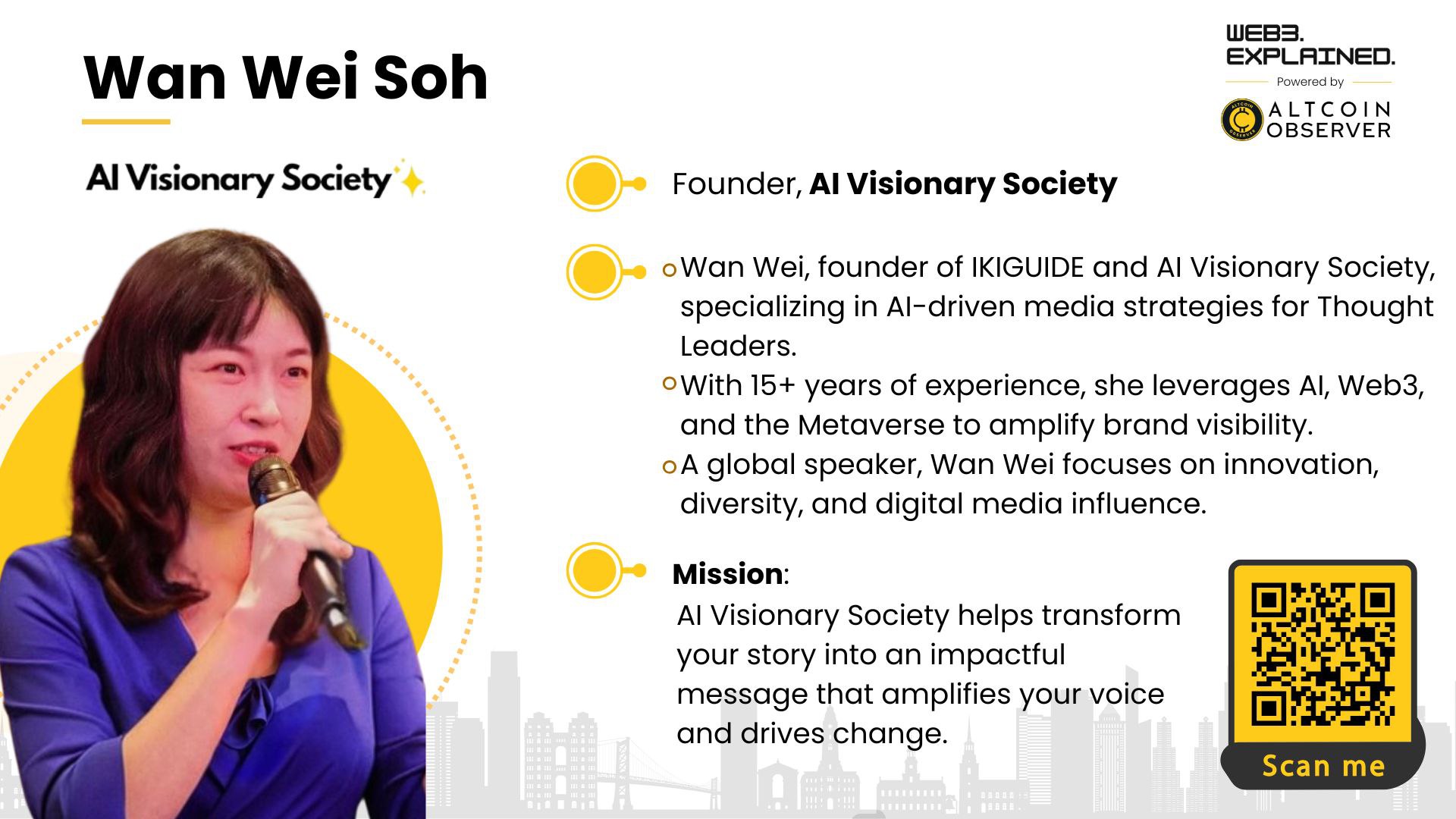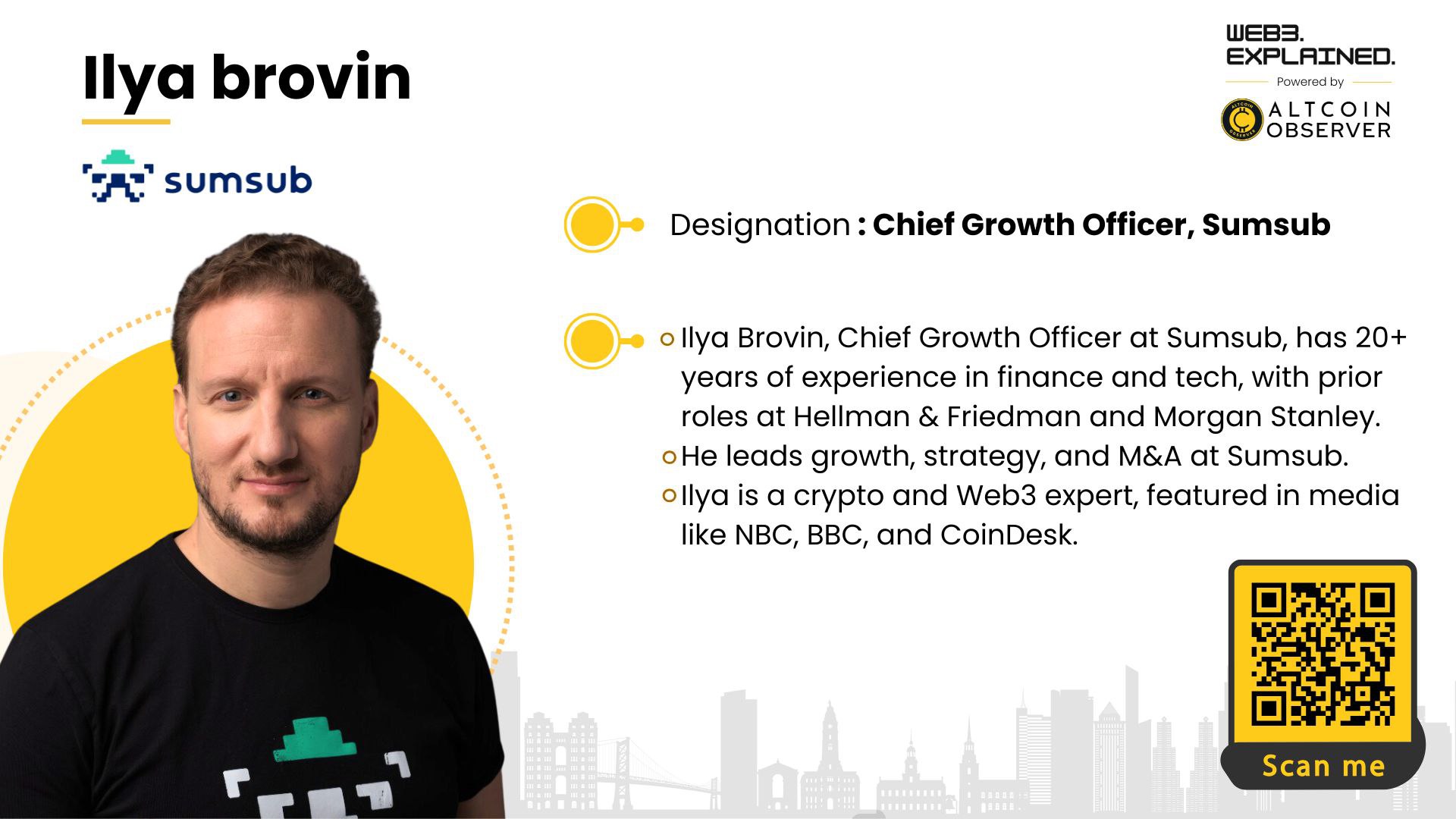
The Future of Digital Identity: How Web3, AI, and Regulation Will Shape Our Online Lives
Experts on what’s at stake in the Digital Identity Revolution
Altcoin Observer invited three leading experts at the intersection of AI, Web3, and identity to unpack the complexities of digital ownership, privacy, and verification.
Digital Identity 3.0: Privacy & Personalization in a Regulated World was the topic of discussion on Web3 Explained: Expert Insights, where the panel explored the fundamental shifts shaping our online identities.
The Identity Crossroads: Ownership, AI & Web3
In today’s AI-driven world, the concept of digital identity is evolving faster than ever. But amidst the rapid technological shifts, a critical question looms: Who actually owns it?
As AI blurs the line between human and machine and Web3 seeks to return ownership of identity to individuals, society is left at a crossroads. Are we moving toward a future where digital identity is self-sovereign, private, and user-controlled? Or are we heading into an era of deepfake fraud, AI-driven manipulation, and regulatory chaos?
Meet the Experts
Nadja Bester — Web3 Growth & Investment Leader
Cofounder, AdLunam Inc.

Nadja Bester is the co-founder of AdLunam Inc., a Web3 investment ecosystem pioneering Proof of Attention and programmable identity solutions. By using behavioral analytics, sentiment scoring, and on-chain data, AdLunam connects early-stage founders with engaged investors and optimizes fundraising and retention.
An award-winning entrepreneur and recognized tech futurist, Nadja is at the forefront of reshaping the digital economy, redefining what it means to own, control, and monetize identity in a world shifting from centralized gatekeepers to decentralized empowerment. A leading voice in Web3 since 2017, she’s been named a top thought leader and influencer by industry powerhouses like Wirex, CoinMarketCap, and Unstoppable Domains.
With a career spanning digital innovation, venture growth, and blockchain ecosystems, she has spent years deconstructing the attention economy—then transforming those insights into strategies that create real-world impact. A sought-after international keynote speaker, investor, and strategist, Nadja is shaping the next era of Web3, where identity isn’t just a data point—it’s power.
Wan Wei Soh — AI Innovation & Ethics Leader
Founder, IKIGUIDE & AI Visionary Society

Wan Wei Soh is the founder of IKIGUIDE and AI Visionary Society, a global platform pioneering AI-driven publicity, networking, and strategic growth.
An award-winning AI strategist and recognized thought leader, she is redefining trust, identity, and influence in an era of synthetic intelligence and decentralized technology. A leading voice in AI ethics and Web3, Wan Wei has advised governments, enterprises, and research institutions on AI governance, metaverse adoption, and digital identity frameworks.
Named a top AI and blockchain expert, she has spoken at over 100 global conferences, shaping conversations on how AI is transforming power, privacy, and participation. A sought-after speaker, strategist, and futurist, Wan Wei is at the forefront of bridging AI innovation with responsible deployment, ensuring the future of digital identity remains secure, ethical, and human-centric.
Ilya Brovin — Digital Identity & Compliance Expert
Chief Growth Officer, Sumsub

Ilya Brovin is the Chief Growth Officer at Sumsub, a global leader in identity verification, fraud prevention, and regulatory compliance across fintech, crypto, and e-commerce.
An expert in financial security and risk mitigation, Ilya has over 20 years of experience shaping AI-driven fraud detection, KYC, and digital identity solutions. He has held leadership roles at Morgan Stanley and Hellman & Friedman, where he helped define best practices in global compliance and financial security.
A recognized authority in fraud prevention and regulatory technology, Ilya leads Sumsub’s mission to bridge the gap between identity verification, privacy, and compliance, ensuring businesses can operate securely and seamlessly in an increasingly digital and decentralized world.
—
Their conversation explores the fundamental reordering of power in an internet where data is the new oil, AI is the new workforce, and decentralization is both a promise and a puzzle.
Watch the full panel discussion here: Digital Identity 3.0: Privacy & Personalization in a Regulated World
—
The Fragmentation of Digital Identity: Web2, Web3, and the Ownership Gap
Who really owns your data?
As Nadja Bester explains:
> “Digital identity is the sum of your online presence—your behavioral data, browsing history, credentials like government IDs and passports, and affiliations, such as all the different social media profiles you have.” — Nadja Bester
Here’s the problem: You don’t actually own any of that data. Google, Facebook, and other Web2 giants do.
> “Web2 platforms own our digital identities. They store all our data, control authentication, and verification happens through their systems. You can’t take your Facebook profile and use it on LinkedIn—these platforms are siloed.” — Nadja Bester
Web3: A New Model—But Not Without Challenges
Enter Web3, which flips this paradigm on its head. Instead of platforms owning your identity, you do—or at least, that’s the goal.
> “Web3 says: ‘You are one person. You are not siloed like your data is.’ As a singular person, you should own your data and control it. If you want to share it, you can. If you want to share only your age without revealing your birth date, that should be possible.” — Nadja Bester
Yet, while Web2 platforms undeniably control vast amounts of user data, Bester acknowledges that digital identity ownership isn’t a simple binary shift from Web2 to Web3. Even with blockchain-based identity solutions, the reality is far from complete self-sovereignty.
Current State of Self-Sovereign Identity
Self-sovereign identity (SSI) is an aspiration, not a fully implemented system. Decentralized identifiers (DIDs), verifiable credentials (VCs), and privacy-preserving identity solutions are still in their infancy. Even today, many Web3 applications still rely on centralized verification systems—such as KYC providers—undermining the full vision of user-owned identity.
> “We can talk about solutions all day—I love talking about self-sovereignty, selective sharing of information via new technologies. But realistically, this isn’t a conversation we’re ready for yet. Even if, after this discussion, you wanted to go all-in and fully embrace a decentralized lifestyle, it’s just not possible. I’d love to live that way, but it doesn’t exist yet. We’re still building it.” — Nadja Bester
While decentralization removes corporate control, it introduces a new kind of visibility—one where every transaction is permanently recorded and potentially traceable. Owning your identity doesn’t automatically mean full privacy.
Digital Identity as an Economic Shift
Beyond privacy and control, Bester emphasizes the economic stakes of digital identity.
“If people understood how much money is being made from their data, they wouldn’t be so quick to hand it over for free. The power of Web3 is that we can finally reclaim what’s ours—but only if we actively participate in the transition.” — Nadja Bester
But monetizing one’s own data is easier said than done. Web2 platforms profit by aggregating and analyzing user data at scale—something that individuals can’t easily replicate. Even in Web3, the mechanics of how users extract financial value from their data are still being developed.
Bester has spoken extensively about this paradigm shift, including in her TEDx talk, Ctrl + Alt + Own: How Your Attention Shapes Value in the Internet of Tomorrow. She likens the Web3 transition to hitting Ctrl + Alt + Del on centralized control, advocating for a more user-centric internet where individuals not only control their data but can also actively monetize their engagement.
However, as Bester points out, adoption remains a major hurdle:
> “Why would people adopt decentralized digital identity? Do they even realize they have a problem that needs solving?”
Without mainstream awareness, the promise of self-sovereign identity remains a niche discussion among Web3 enthusiasts. Most users prioritize convenience over sovereignty—meaning Web3 identity solutions must be seamless to drive real adoption.
The Role of AdLunam in Bridging the Gap
This is where AdLunam plays a role. By quantifying investor engagement, it seeks to merge engagement, digital identity, and tokenized rewards, creating pathways for users to own their online presence in a financially meaningful way.
While Web3 identity infrastructure is still developing, Bester sees platforms like AdLunam as stepping stones—not just toward ownership, but toward real user incentives. Because ultimately, digital identity won’t shift unless people see clear, tangible benefits.
Takeaway? Web3’s promise of self-sovereign identity isn’t just about decentralization—it’s about making ownership easy, rewarding, and worth the effort.
—
AI Is Changing the Identity Game—For Better and Worse
AI’s Role in Shaping Modern Digital Identities
While Web3 aims to put identity back in the hands of individuals, AI is making the whole idea of identity blurrier than ever.
If AI is becoming indistinguishable from humans, what does that mean for digital identity?
Deepfakes, AI Avatars, & Synthetic Identities
Wan Wei Soh highlights the growing intersection of AI-powered identities, automation, and synthetic personalities:
> “If we combine these trends, the implication is that by 2025, people may struggle to distinguish between AI and human beings.” — Wan Wei Soh
This shift is already happening. The rise of AI-generated influencers, deepfake video bots, and automated agents means that identity itself is evolving beyond human exclusivity. But with this evolution comes risk.
> “Could AI be seen as an ally? By ‘ally,’ I mean recognizing it as a non-human entity that should not be mistaken for a human. The key question for digital identity is: if AI agents become central to this space, what are the implications for how we interact with them?” — Wan Wei Soh
The implications stretch beyond just fraud and misinformation—AI-driven identities may redefine our relationships with online trust, authority, and even community participation. If AI-generated personalities gain enough traction, they may become influencers in their own right, shaping opinions, market trends, and digital economies.
> “I’ve been closely monitoring the Web3 market, and it feels like people are using AI agents the way they used NFTs during the 2021 boom—throwing the term around without fully understanding what it means. It feels like another hype cycle.” — Wan Wei Soh
Soh sees AI’s role in digital identity as both a technical challenge and a human one. The fundamental question isn’t just how AI is integrated into identity systems, but whether users even understand how their own data is being used in this new landscape.
> “Differential privacy is a popular concept in this context. Essentially, AI is used to identify trends without revealing individual users’ identities, which is crucial.” — Wan Wei Soh
Risks of AI in Replicating Personal Digital Presence
Soh warns that as AI advances, the ability to replicate a person’s digital presence will become disturbingly easy.
> “Deepfakes and AI-generated personas are evolving faster than our ability to regulate them. We’re heading into a future where your face, voice, and entire identity can be replicated without your consent. That’s the real risk.” — Wan Wei Soh
This issue extends beyond social media. AI-powered voice clones are already being used for scams, and fraudulent synthetic identities are slipping through identity verification processes at alarming rates.
> “Sumsub’s deepfake report is excellent research. It connects perfectly to this discussion because it highlights how the line between real and fake is increasingly blurred. Even experts struggle to align on AI-related discourse because definitions vary so much.” — Wan Wei Soh
At AI Visionary Society, Soh and her team help founders, entrepreneurs, and thought leaders understand the implications of AI-driven influence. Her organization specializes in AI-driven publicity strategies, ethics workshops, and research on the blurred lines between AI and human-generated content, ensuring that founders use AI responsibly while maintaining their own digital authenticity.
Manipulating Human Vulnerabilities: The Dark Side of AI
For Soh, one of the greatest risks is how AI is programmed to manipulate human vulnerabilities.
> “If someone is lonely and AI-generated boyfriends and girlfriends flood the market, wouldn’t they end up sharing their most intimate personal data with these bots? The issue isn’t just personalization, privacy, or AI—it’s that humans have vulnerabilities, and AI does not.” — Wan Wei Soh
Soh has seen first-hand how social engineering exploits human psychology to bypass even the most secure systems. She cites a personal experience of falling for an early Ethereum scam, emphasizing that losing money—or privacy—is rarely about intelligence, but rather about emotional manipulation.
She stresses that without clear safeguards, AI could fundamentally reshape not just personal identity but also trust in digital interactions.
> “Understanding your own vulnerabilities becomes more critical over time. If we want to talk about balance, the first step is recognizing that we are all human, and that means we are all vulnerable.” — Wan Wei Soh
Her key takeaway?
> “Ultimately, balance comes back to self-awareness. Do people truly understand their own vulnerabilities?” — Wan Wei Soh
The challenge isn’t just technological—it’s psychological. AI and digital identity cannot be addressed in isolation; they are fundamentally linked to the way humans process trust, risk, and convenience in a hyper-connected world.
—
Regulation Is Coming—And It’s Not Web3-Friendly
As Web3 champions self-sovereign identity, regulators are racing to keep pace with AI-driven fraud, deepfake manipulation, and the risks of an unverified digital world. The challenge? Balancing privacy, security, and accessibility without stifling innovation.
Ilya Brovin and Sumsub sit at the center of this battle, adding urgency to the regulatory conversation
The Inclusion Gap: Millions at Risk
More than mere fraud prevention, regulation can also facilitate inclusion. Greenflag, Sumsub’s latest research shows that 627 million people face digital exclusion due to barriers like outdated ID documents, low digital literacy, and systemic discrimination.
Without inclusive verification solutions, entire populations risk being locked out of the digital economy. The future of digital identity cannot be a binary choice between centralized control and total decentralization.
The need for more inclusive verification solutions is crucial. Without them, entire populations risk being locked out of the digital economy.
Sumsub is working to bridge this gap, helping leading crypto exchanges, fintech startups, and payment platforms integrate regulatory compliance without sacrificing accessibility.
The Rise of Deepfake Fraud & AI-Driven Identity Theft
Identity verification isn’t just about KYC (Know Your Customer) checks anymore. The rise of deepfake fraud and AI-generated identities is forcing regulators and businesses alike to rethink security.
Sumsub’s research highlights a fourfold increase in AI-powered identity fraud, as deepfake technology becomes more sophisticated, and Sumsub
Brovin has seen first-hand how deepfake technology is being weaponized for fraud and identity theft.
> “Our recent Fraud Report highlights a fourfold rise in deepfake fraud, particularly AI-generated deep fakes, making these traditional methods increasingly unreliable.” — Ilya Brovin
Without resilient and adaptive fraud prevention tools, digital identity solutions—whether centralized or decentralized—will be increasingly vulnerable.
Web3’s Privacy Paradox: Decentralized But Still Traceable
Sumsub is leading efforts to create identity verification frameworks that balance privacy and security while ensuring broad accessibility.
> “As of today, there’s no real alternative. Yes, we have the vision of a fully decentralized, self-sovereign identity, but in reality, we have to bridge that vision with outdated, off-chain regulations.” — Ilya Brovin
While Web3 promises privacy and self-sovereignty, Brovin warns that this promise is often overdrawn.
> “When we talk about blockchain, Web3, and the idea of ‘lack of surveillance,’ it’s almost an oxymoron. All transactions are publicly traceable, and the only real anonymity comes from nobody knowing your wallet address—but that anonymity is eroding quickly.” — Ilya Brovin
The reality? Regulatory scrutiny is inevitable. The DeFi space and unhosted wallets remain largely outside compliance frameworks, but that won’t last forever, says Brovin.
Regulation is coming, and companies that fail to integrate proper compliance frameworks now will face major consequences.
The Path Forward: Hybrid Identity Models & Compliance Integration
The Web3 industry needs a compliance-first mindset to avoid regulatory crackdowns. Waiting until enforcement arrives isn’t an option.
Brovin sees a hybrid model—where traditional KYC frameworks integrate with decentralized identity solutions—as the likely outcome.
> “The future of digital identity isn’t just decentralized or centralized—it’s hybrid. We need solutions that provide privacy and self-sovereignty while still meeting regulatory requirements.” — Ilya Brovin
As MiCA regulations take effect in Europe, and other global frameworks evolve, Web3 companies must integrate compliance now rather than scramble later.
> “At Sumsub, we’re allowing people to reuse real-world identities in a secure, controlled way within Web3. This means their identity can be centrally stored but extended into Web3, enabling compliance when needed.” — Ilya Brovin
The bottom line? The battle over digital identity won’t just be fought on the blockchain—it will be shaped by regulation, compliance, and security innovation.
—
Conclusion: The Future of Digital Identity Is Unwritten
Key Takeaways from Industry Leaders
According to these experts, one thing is clear: digital identity is still up for grabs.
Bester frames the challenge simply:
> “Why would people adopt decentralized digital identity? Do they even realize they have a problem that needs solving?” — Nadja Bester
Soh emphasizes self-awareness:
> “If we want to talk about balance, the first step is recognizing that we are all human, and that means we are all vulnerable.” — Wan Wei Soh
Brovin warns of the regulatory bottleneck:
> “There’s a long list of challenges. One major issue is that regulations haven’t kept pace with technology.” — Ilya Brovin
So what happens next? The battle for control over digital identity is just beginning, and decisions made in the next few years will determine whether users reclaim ownership or corporations and AI systems tighten their grip.
> “Yes, there are challenges. Yes, there are opportunities. And yes, there’s a massive amount of work to be done. So we’d better get back to it.” — Nadja Bester
Watch the Full Panel Discussion Here
Digital Identity 3.0: Privacy & Personalization in a Regulated World
Where do you stand on the future of digital identity? Will decentralization empower users, or will AI and regulations dictate the rules?
Join the conversation! Tag @AltcoinObserve @AdLunamInc, @Aivsofficial, and @Sumsubcom on X (Twitter) and LinkedIn.
Learn more about AdLunam, AI Visionary Society, and Sumsub:

Co-Founder, AdLunam Inc. & Altcoin Observer | Web3 Fundraising and Growth Specialist | Host of The Future of NFTs | International Keynote Speaker | Thought Leader in Decentralised Technologies and Digital Economies | Startup Advisor and Tokenised Assets Investor.
Navigate
© Copyright Nadja Bester. All rights reserved.






